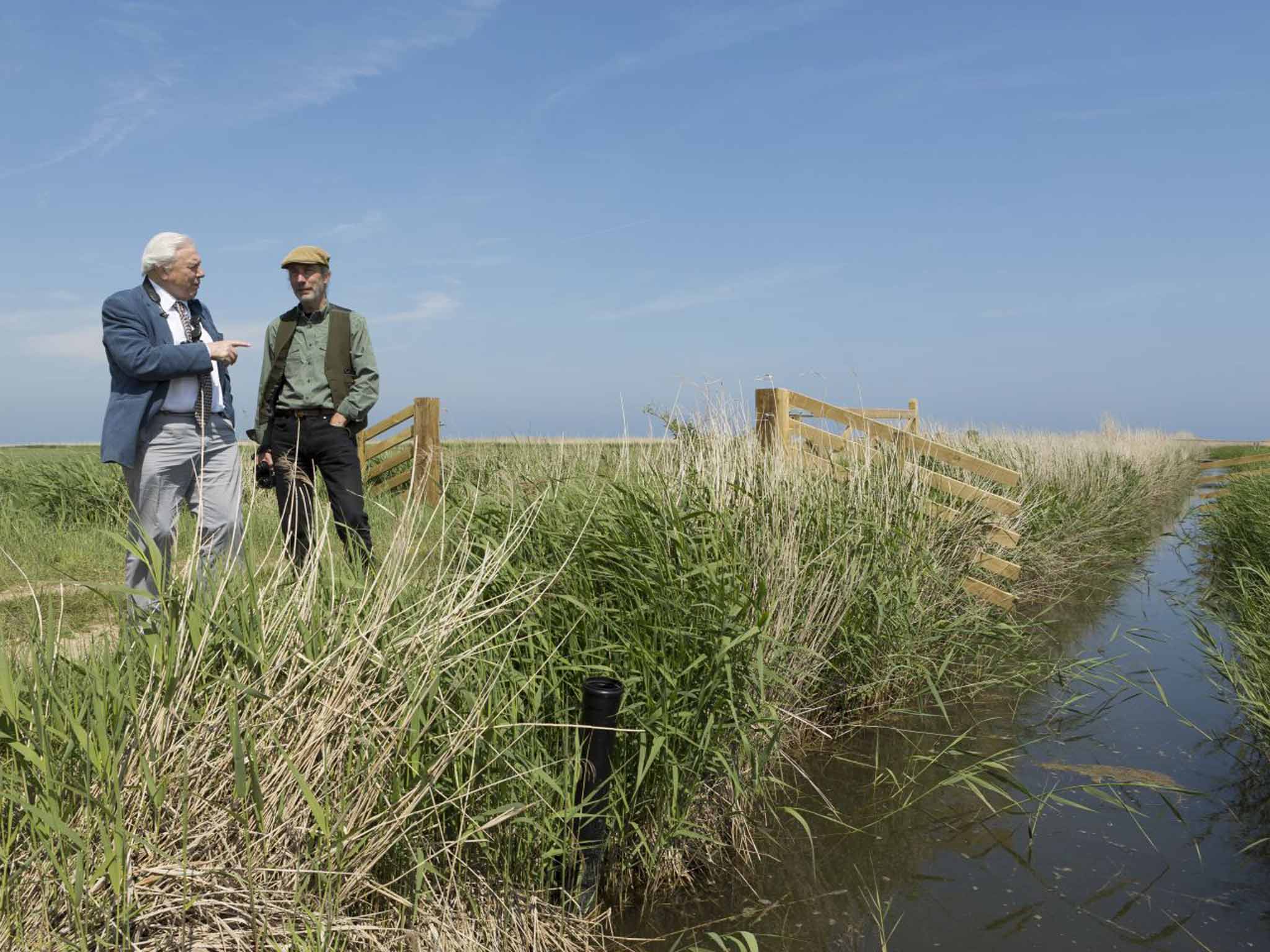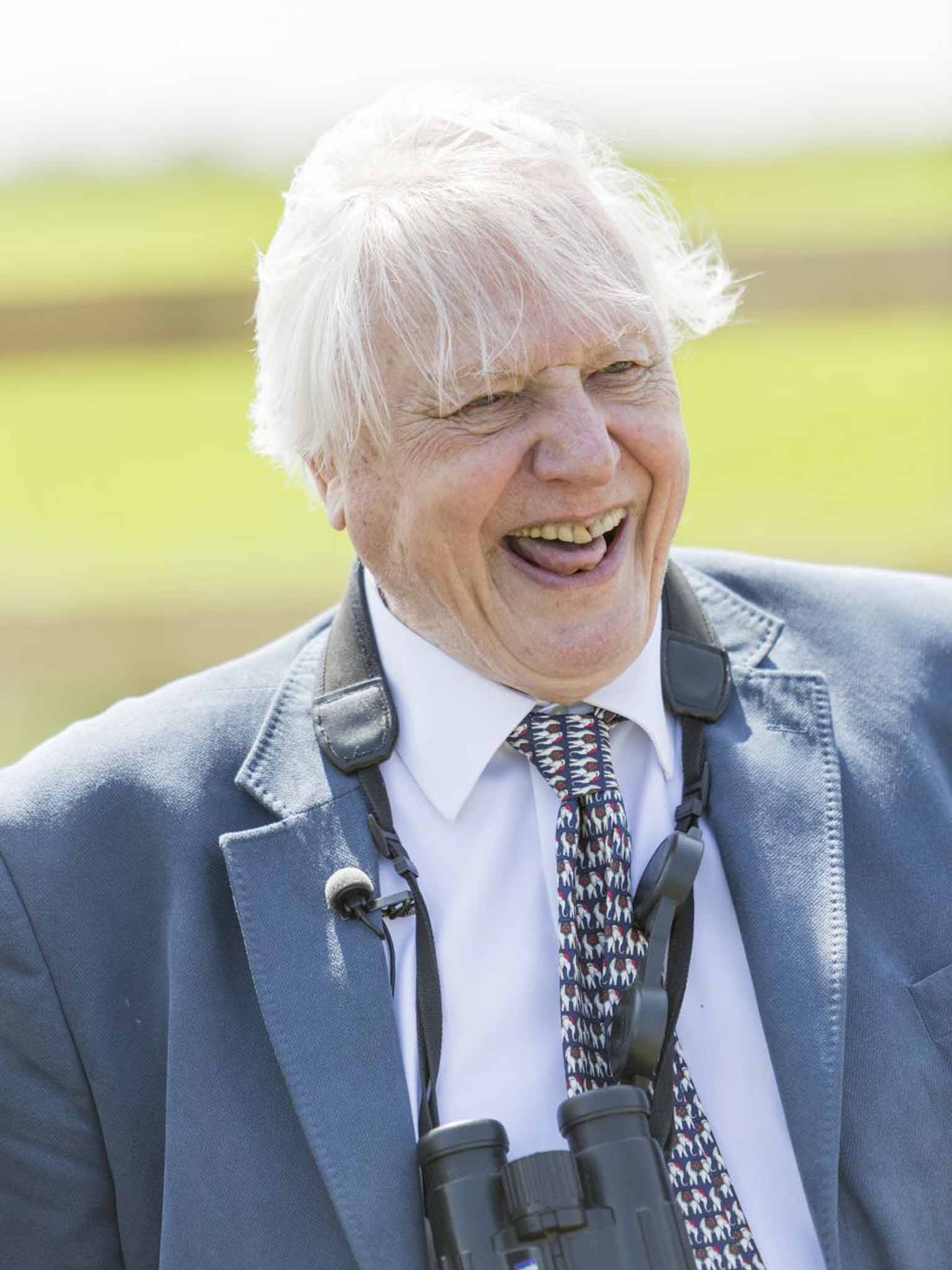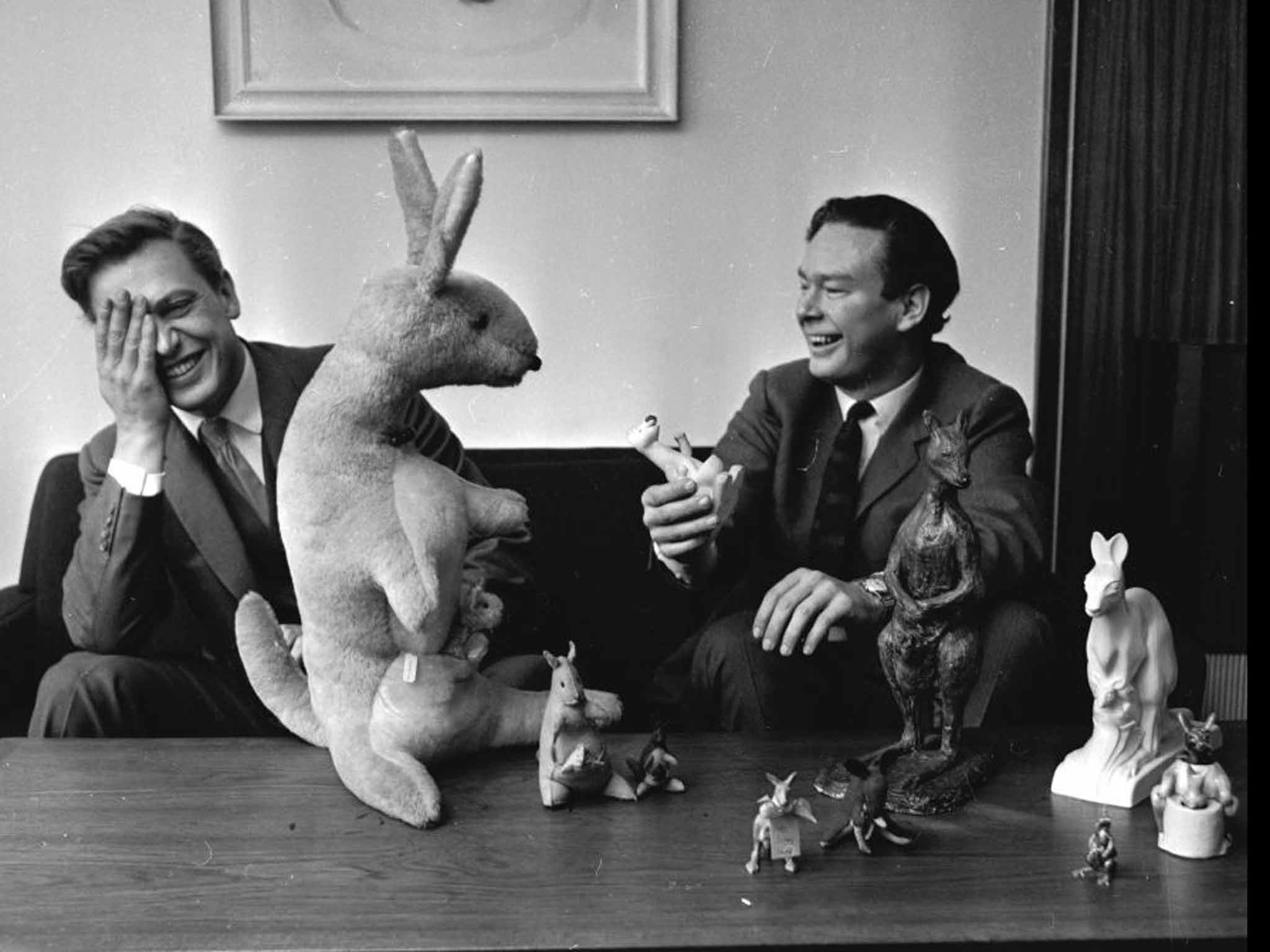David Attenborough and me: an inspirational journey of a lifetime
There is no one quite like the world's greatest living naturalist. And long before Barack Obama felt the Attenborough effect, there was Simon Barnes

Your support helps us to tell the story
From reproductive rights to climate change to Big Tech, The Independent is on the ground when the story is developing. Whether it's investigating the financials of Elon Musk's pro-Trump PAC or producing our latest documentary, 'The A Word', which shines a light on the American women fighting for reproductive rights, we know how important it is to parse out the facts from the messaging.
At such a critical moment in US history, we need reporters on the ground. Your donation allows us to keep sending journalists to speak to both sides of the story.
The Independent is trusted by Americans across the entire political spectrum. And unlike many other quality news outlets, we choose not to lock Americans out of our reporting and analysis with paywalls. We believe quality journalism should be available to everyone, paid for by those who can afford it.
Your support makes all the difference.Behind us a spoonbill of all things. The voice of Cetti's warbler. And eight unbroken miles of incomparable coastline, rich as an oligarch, but in life, not lolly. Before us an imposing and ancient figure was making a fine speech about the wild world, like a benign King Lear, white locks lifted in the sprightly breeze. Above his head a skylark rose into the vast Norfolk sky to pour and pelt music.
"Every breath of air and bit of food we eat comes down to the natural world. We have got to understand it." Here was Sir David Attenborough in action, once again giving his time and his energy to the great cause he believes in: which is nothing less than protecting the future of the planet we all live on.
A couple of hundred of us had gathered here to celebrate the opening of a new nature reserve. A short while before this, Attenborough had been giving out the same message to Barack Obama. The president, determined to tackle the big environmental issues in the teeth of Republican denial of climate change, had invited Attenborough to the White House to discuss the direction the planet is heading in. Quite some gig for a TV presenter. Except that Attenborough is rather more than that. He has reluctantly but full-heartedly accepted the role thrust toward him: that of the nagging conscience of planet Earth.
Obama spoke about climate change: "Part of what I know from watching your programmes, and all the great work you have done, is that these ecosystems are all interconnected." Attenborough talked to the world's most powerful man about population growth, climate and renewable energy: the biggest of big issues.
And it's all interconnected with – well, this fine little chunk of planet in north Norfolk. Here, along with a fabulous new bit of marsh, is a new building designed to educate people in the ways of the wild world. It's a triumph: a great project of the Norfolk Wildlife Trust. Attenborough is president of all 47 of the UK's county wildlife trusts and he never takes on anything without putting heart and soul and guts into doing it right.

He was greeted by a series of rightly awestruck people, all involved in conservation in different ways. The car-park volunteer actually bowed as he drove in, only half ironically. These bunfights are proper on-your-best-behaviour occasions. So naturally, after David and I had exchanged greetings – hadn't seen him for ages – I told him an improper story.I felt it my duty to supply a moment of relief in a demanding day. He was required to pour out his energies to all-comers, for everyone there wanted a little touch of Attenborough to go home with. It would set the deal on a great day, and keep them inspired for future environmental and wildlife conservation work, campaigning and research.
I started being inspired by Attenborough in 1956, when I was five and his Zoo Quest for a Dragon programmes captured my imagination. This was the famous series in which he made the then highly intrepid trip to the Indonesian island of Komodo, to film the vast and extraordinary lizards that evolved to become the apex predators of that impossible little place.
I actually met him for the first time about 10 years ago. We were at the headquarters of the Linnean Society at Burlington House in Piccadilly. It was here that Darwin's theory of evolution by means of natural selection was first introduced to the scientific community in 1858 – to a wave of total indifference, though that was of course to change.
Attenborough and I were in the Lin-Soc's superb double-decker library, attending another conservation do, this time for the World Land Trust. As chance would have it, I had a bottle of wine in my hand. I glimpsed Attenborough with an empty glass, so I filled it and we spoke. And carried on speaking.
I would swap every professional honour, every half-decent book review and every crumb of praise I have received for that one conversation. I have written a million words about wildlife and conservation: to raise a glass with Attenborough was my Oscar.
Now, in Norfolk, the two of us went on to the Trust's newly acquired stretch of marshland, the sound of sedge warblers all about us, birds that never sing the same song twice in a lifetime. For years, this area had been in the hands of wildfowlers. Wooden ledges had surrounded every pool; they were placed there so wounded birds couldn't escape.
All gone now, thankfully. The Trust bought this area with the help of private donations and a hefty lottery grant. It joins up with their long-standing reserve at Cley, and that in turn links with the long, intimidating shingle strip that leads to Blakeney Point, which is home to breeding terns and the two British species of seals.
Treading on the land is different to looking at it from a height. On the ground you can hear the reed warblers all around and savour the ironed-flat coast under the vast blue dome of Norfolk sky. David cut the ribbon and said a few appropriate things. He spoke to the people from local television. Then he took a break and scanned the marsh though binoculars. "Spoonbill on the pond, at the back, on the left," I said helpfully. "And a little egret to the right."
"That's no spoonbill. It's just a seagull, you don't know what you're talking about." This merry joshing continued as we looked out across this remarkable place. It was exhilarating to delight not just in the place itself but in the fact that it has been saved. It's there as a home for spoonbills and seagulls, it's there to lift the hearts of humans, and it's now as safe as such a site ever could be.
My improper story had concerned a little Australian girl and her vivid use of inappropriate language, so David told me a story about a child he had met at another public appearance. The boy, keen on natural history, was introduced and it was announced that we wanted to ask David a question. "So I said 'yes, please go ahead,' hoping it wasn't going to be something I knew nothing about, which was of course highly likely. But no. He asked: 'How long is a Komodo dragon?' So I thought, phew, that's easy enough. And I said I had been on Komodo more than once and had actually measured several Komodo dragons, and the longest I had found was 12 feet. And the little boy said: 'WRONG!'"
I was about the same age as the boy in question when I acquired the book of the series, also called Zoo Quest for a Dragon. It was my school prize: I received it when I left junior school. It's on my bookshelf still.
It was the lemurs that haunted my imagination. They turned up in a subsequent series, Zoo Quest to Madagascar. Attenborough was desperate to find a particular species of lemur that had never been filmed before. It became something of a holy grail quest. It was the first time that I had grasped the idea of scarcity, the first time I understood about "too late".
"What was that lemur you were trying so hard to find?" I'd asked David over a second glass of wine in the Lin-Soc Library. "Indri!" The indri is a lemur that looks like a mad black and white teddy bear. It's critically endangered, because of forest destruction. It is, more than ever, a symbol of the fragility of the ecosystems that sustain the planet.

This understanding of fragility and of specialness haunted me even when teenage years took me away from the wild world. But in my secret heart, I still wanted to walk though the rainforest, I wanted to be among the sweat and the leeches, I wanted to do something for the ravaged environment and for the creatures we still share it with.
If I couldn't find an indri or measure a dragon, I still had a ridiculous, never-expressed notion that one day I would stand in the jungle looking up at the canopy. I wouldn't be explaining stuff: I wouldn't be using David's much imitated but ultimately inimitable tones that combine innocent joy with searching intellect: "And… it is teeming with LIFE." But I still had this ridiculous image of myself helping with something important in a hot wet forest.
I temporarily mislaid the wild world. This was while Attenborough gave up exploring to be controller of BBC2. In this time he quite incidentally formed much of my musical tastes, and they have lasted a lifetime. At one stage he broadcast Monteverdi's Vespers on primetime terrestrial television: can you imagine that now?
I've never heard him play, but he's apparently a very decent pianist. We once discussed the one piece of music we would keep when all others were consigned to the bottomless pit: we both went for the Goldberg Variations, and even agreed on the recording, that of Murray Perahia.
I was reunited with the wild world in my late twenties, and the prime mover in this was, of course, Attenborough. The work of his middle period was his masterpiece. It was the first of the Life trilogy, Life on Earth, that reopened my eyes and made me wonder why I'd ever been away.
My instinctive delight in the wild world was now mixed with a mature understanding. It's not just wonderful: it's also meaningful. Both these things are relevant, I think. It's that combination that has always defined David's nature as well as his broadcasting style. He unites the child and the grown-up in us across the waste of the years.
That tends to raise some rather big questions. God for example. Here's Attenborough on belief in a deity: "My response is that when a creationist talks about God creating every individual species as a separate act, they always cite hummingbirds or orchids or sunflowers and beautiful things. But I tend to think instead of a parasitic worm that's boring through the eye of a boy sitting on the bank of a river in West Africa, that's going to make him blind. And [I ask them]: are you telling me that the god you believe in, who you say is an all-merciful god, who cares for each and every one of us individually, are you saying that God created this worm that can live in no other way than in an innocent child's eyeball? Because that doesn't seem to me to coincide with a god who's full of mercy."
To visit his house is to see not just a range of treasures but a range of challenges. "What do you think this is?" he asks. It was a round stone that was clearly more than a stone. "Er – sea urchin?" He didn't say WRONG but he meant it. He was jubilant with the correct diagnosis, not because I was WRONG but because the truth was more remarkable than my guess. "Poo! It's dinosaur poo!" A coprolite in the heart of Richmond: a treasure richer than all our tribe.
He's not always right of course. He told me how he was once filming in Morocco, and had a very brief opportunity to visit a seller of fossils. He was greatly pleased with his lightning purchase of two trilobites: extinct creatures roughly the size of your fist. They were apparently fossilised while doing their best to make more trilobites. "Trilobite jig-a-jig!" the salesman had gleefully explained. On the drive back to the BBC unit Attenborough realised that he had been had. The great purchase turned out to be two separate fossils superglued together.
Trust is not something you can fake. And Attenborough has always been conscious that to be trusted is a privilege that makes great demands on the person trusted. The idea of Attenborough doing a TV commercial is to him absurd: in his view, almost obscene. He was criticised for taking his time before publicly accepting the fact of climate change: but he wasn't going to get it wrong. He wasn't going to go off half-cock. When he expresses a view about anything, you know it's fully baked. He's done the research, he's listened to the right people, he done the thinking.
He's a fearsomely forceful person when he feels fearsomeness and force are appropriate. He loathes any hint of unprofessionalism: "Just make it clear you know what you're doing," I brief any photographer about to shoot him. The interviewer, Lynn "the Demon" Barber claims to have been reduced to terror by Attenborough's contemptuous response to her ineptness with a tape-recorder.
There must be temptations to take time out and bask in the world's admiration. After all, he's 88 and has dodgy knees. If anyone has earned the right to sit back and enjoy the spoils of a hard-earned reputation, it's Attenborough.
But he doesn't. He's active in the ecological problem that dare not speak its name: the one that many politicians don't dare talk about. And that, of course, is the one of human population growth. If we carry on as we are, we're going to need another couple of planets before the century is out.
"There is only one straw that you can cling to and that's when women are given rights over their own bodies," he says. "When they have political independence, when they have medical facilities to enable them to control the number of children they bear, when they are literate, when they have the vote. When these things happen the birth-rate falls." That's as relevant as anything Attenborough has said in more than 60 years of broadcasting.
Attenborough's influence made me attempt a book about the entire animal kingdom. And because of him, I have been in quite a lot of jungles, as a council member of the World Land Trust. The patron of this fine organisation is of course Sir D, who else? WLT buys up land that's important for wildlife, but they don't own an inch of it. It's bought on behalf of cash-strapped wildlife NGOs in the developing world. I've visited projects in Brazil, Belize, India, Borneo, Zambia and Armenia. So when WLT ask me to do something, I jump. I jibbed on one just occasion. "No no no no – this is wrong. I'm not doing it. I'm absolutely not speaking after David Attenborough. I'm speaking before."
But I wasn't. They insisted. I had to step up and speak out for wildlife conservation and do so after David had done his stuff. A guitarist coming on after Jimi Hendrix would have been less intimidated. So I attempted to make a virtue of this predicament.
I said that it was tough following David Attenborough, but then I realised that I had spent most of my life following David Attenborough. And after elaborating on this, I came back to the World Land Trust and to David's views on conservation – and I said that the entire world would be a better place if we all followed David Attenborough. Nor was I flattering the man, I was speaking the simple truth.
So there we were at Cley at the very top of Norfolk on a perfect day. This was a great achievement for conservation, a day full of sunlight, birdsong and hope. You don't flinch from the bad things and you always support the good things: no need to ask where I leant that principle. He gave a fine rousing speech that encouraged all the conservationists to keep on keepin' on.
And I wondered just how many of the people there – all those workers and donors and supporters of wildlife conservation, all involved in the great task of trying to look after our planet – were present and doing what they do at least in part because of Sir David Attenborough. I reckoned that 100 per cent was not far off. Starting with me.
Simon Barnes's books include 'My Natural History: The Animal Kingdom and How It Shaped Me' , and 'How To Be A Bad Birdwatcher'
Barack Obama's interview with David Attenborough will be repeated at 6pm tomorrow on BBC1
Join our commenting forum
Join thought-provoking conversations, follow other Independent readers and see their replies
Comments